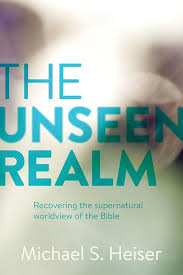We aren’t comfortable talking about spiritual beings. For those of us, even Christians, who grew up in a world dominated by science and a material mindset, talk of angels and demons just feels weird.
Even when we read the Bible, we tend to downplay such topics. In The Unseen Realm, however, Michael Heiser opens our eyes to what is hiding in plain sight.
We know about the angels in the Christmas story and the demons Jesus challenged. Paul also offers a rich vocabulary for such beings which includes “the rulers . . . the authorities . . . the powers of this dark world and . . . the spiritual forces of evil in the heavenly realms” (Eph 6:12).
Heiser, however, focuses on the divine counsel that appears in Job 1–2. You remember—in the midst of this assembly comes The Accuser (aka Satan) who casts doubts on Job’s character and loyalty to God.
While God doesn’t need spirit helpers (as he doesn’t need human ones either), he has chosen to use them, to let them participate in his work—and they are much more involved than we might think.
As Heiser puts it, “Though the kingdom story of the Bible is rarely taught with it in mind, the divine council plays an important role throughout that story’s unfolding. The scriptural pattern is that, when God prepares to act in strategic ways that propel his kingdom forward, the divine council is part of that decision making. The council is the vehicle through which God issues his decrees” (p. 349).
Is he overstating things? There’s more than we might think. Consider the “let us” language of Genesis 1:26 and 11:7. Or the “myriads of holy ones” who came with God when he gave the law on Sinai (Deut 33:1-2; Acts 7:52-53; Gal 3:19). Or those who participated when Isaiah was commissioned (6:1-7). Or another scene much like the one in Job (1 Kings 22:13- 28). Or those who will occupy the multiple thrones of Daniel 7:9 and Revelation 4:1-8.
Yet some rebelled, turned their back on God. The Bible doesn’t exactly tell us why or how. Our ideas on this backstory owe more to Milton’s Paradise Lost than Scripture. But rebel they did.
In Psalm 82:1-7 God judges these beings for supporting the wicked and oppressing the weak. Sometimes they are referred to as gods (Ex 15:11; 1 Kgs 8:23; Ps 97:9), gods who are completely inferior to Yahweh, the true God. We see their ultimate fate in the book of Revelation.
While The Unseen Realm is massively researched, Heiser is a Scripture nerd who writes so nonexperts can follow along. In plain language he answers questions like:
- Are these beings “gods”?
- Why are they called “sons,” and how does Jesus as the only Son fit in?
- How did ancient people think about spiritual beings?
- Who are the Nephilim of Genesis 6:1-4 anyway?
- What in the world is Paul talking about when he says we will judge angels (1 Cor 6:3)?
- Why wasn’t the Old Testament more explicit about a Divine Messiah dying and rising again?
- And where is Armaggedon . . . really?
But The Unseen Realm is more than a collection of questions and answers about oddities in the Bible. Heiser sees the whole sweep of God’s plan for creation tied up in these issues. The main purpose of his book is, in fact, to unveil for us this grand narrative.
That is the topic of my next installment.


2 thoughts on “The Unseen Realm of the Supernatural”